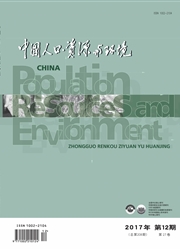

 中文摘要:
中文摘要:
蔬菜消费在中国居民的食物消费中占据极其重要的地位,但化学农药的施用严重影响了蔬菜质量安全,推广和施用生物农药成为当前提高包括蔬菜在内的农产品质量安全的最现实的路径.然而,本文对中国江苏省丰县294户蔬菜种植农户的调查显示,分别有66.00%、71.43%和69.05%的受访农户对生物农药没有认知、没有施用过生物农药和对生物农药的施用效果持怀疑态度.为进一步考察农户施用生物农药的意愿,本文以理性人为假设条件,以农户性别、年龄、受教育年限、对农药的残留认知、家庭蔬菜种植面积、蔬菜价格水平认知作为自变量,并基于二元logistic模型存在偏误与分离问题,引入带罚函数的二元Logistic模型,计量结果显示,具有女性、年龄在40岁以下、感知化学农药残留危害、受教育年限在9年及以上等个体特征和家庭蔬菜种植面积在5亩以下、非农业性收入在3万及以上、参加农业合作组织等家庭特征的蔬菜种植农户更愿意施用生物农药,而政府补贴与政府农药施用的技能培训对蔬菜种植农户施用生物农药意愿的驱动不足.据此,本文提出了,政府应该借助于农业合作组织推广生物农药;加大对施用生物农药的支持力度;指导农业生产合作组织应重点建设优质农产品的销售网络等政策.
 英文摘要:
英文摘要:
Vegetable consumption occupies a very important position in the food consumption of Chinese residents; however, the use of chemical pesticides has a serious impact on vegetable quality and safety. At present, promotion and application of biopesticides have become the most practical ways of improving the quality and safety of agricultural products, including vegetables. Interestingly, in the present study, a survey of 294 vegetable farmer households in Cangshan County, Shandong Province, China demonstrated that 66.00%, 71.43% and 69.05% of the respondents had no knowledge of biopesticides, had never used biopesticides and were skeptical about the effect of biopesticides, respectively. Furtherly, in order to study willingness to adopt biopesticides, this paper supposed that farmers are rational, men, and regarded gender, age, income, education, household vegetable planting area, perceiving hazards of chemical pesticide residues as independent variable. Based on binary logistic regression model exists the problem of bias and separation, this paper introduced penalized binary logistic regression model. The results produced by the penalized binary logistic regression model revealed that vegetable farmer households with individual characteristics such as the inclusion of female( s), under the age of 40, perceiving hazards of chemical pesticide residues and with 9 years of education or above, as well as household characteristics such as with a household vegetable planting area of less than 5 mu (0.33 ha), with a non-agricultural income of 30,000 yuan or above and participating in agricultural cooperatives are more willing to use biopesticides. Thus, the driving force of government subsidies and pesticide application skill training provided by the government are insufficient at increasing vegetable farmers' willingness to adopt biopesticides. These findings bear a wealth of policy implications for policy decision-making, the government should promote biopesticides by means of agricultural cooperative organizati
 同期刊论文项目
同期刊论文项目
 同项目期刊论文
同项目期刊论文
 期刊信息
期刊信息
